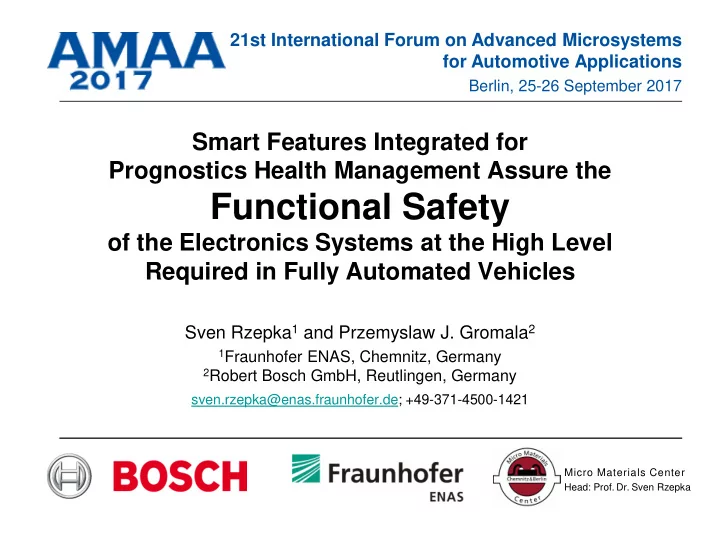

21st International Forum on Advanced Microsystems for Automotive Applications Berlin, 25-26 September 2017 Smart Features Integrated for Prognostics Health Management Assure the Functional Safety of the Electronics Systems at the High Level Required in Fully Automated Vehicles Sven Rzepka 1 and Przemyslaw J. Gromala 2 1 Fraunhofer ENAS, Chemnitz, Germany 2 Robert Bosch GmbH, Reutlingen, Germany sven.rzepka@enas.fraunhofer.de; +49-371-4500-1421 Micro Materials Center Head: Prof. Dr. Sven Rzepka
Intro Introdu ductio ction Number & Complexity of ECUs , Driver Passenger • Automated Cars: Functional safety requirement exceeds today's automotive spec Will soon be unaffordable • SoA approach: System-level redundancy • New approach in AE: Active Prognostic Health Management (PHM) Micro Materials Center Head: Prof. Dr. Sven Rzepka
Prognostics and Experimental & Experimental & Experimental & Experimental & Experimental & Experimental & FMMEA / FMMEA / FMMEA / FMMEA / FMMEA / Infrastructure, Infrastructure, Infrastructure, Infrastructure, Infrastructure, Infrastructure, Health Manage- Design Area Design Area Design Area Design Area Design Area Design Area Physics of Failure, Physics of Failure, Physics of Failure, Physics of Failure, Physics of Failure, Sensors, Sensors, Sensors, Sensors, Sensors, Sensors, Data Driven Approach Data Driven Approach Data Driven Approach Data Driven Approach Data Driven Approach Hardware Hardware Hardware Hardware Hardware Hardware ment (PHM) Data Readout & Processing Critical Parameters Infrastructure in Extreme Meta Models, Meta Models, o Developing the required infras- Integration Environments Model Order Model Order Variation- of new Sensors tructure, sensors, electronic HW induced fai- Reduction Reduction Collectors lure risks o Studying and characterizing the (Sensors, Failure Modes and Mechanisms Acceleration Canaries, …) Standardized Safe Real T ime Models by thorough Effect Analyses for and Secure Data Prediction Exchange Prognostic Prognostic Prognostic Prognostic Prognostic Prognostic Prognostic PoF & data driven approaches Capabilities Health Health Health Health Health Health Health o Providing appropriate solutions Management Management Management Management Management Management Management to the data acquisition, manage- Model Demonstration ment, and secure data transfer Consolidation of Improvement of AE System Health Assessment for Signals o Performing data fusion for reach- Integration Data (Sources) ing at an integrated single health assessment, diagnostics, and Data Exploration and Hypothesis prognosis score per application Data Data Data Data Generation PoF Model Generation o Establishing highly efficient yet Acquisition, Acquisition, Acquisition, Acquisition, and Validation Management Management Management Management precise metamodeling and mod- Health Health Health & Transfer & Transfer & Transfer & Transfer el order reduction schemes that Assessment, Assessment, Assessment, can be executed in each of the Diagnostics, Diagnostics, Diagnostics, individual cars locally assisted by Micro Materials Center Prognostics Prognostics Prognostics self-learning capabilities provid- Head: Prof. Dr. Sven Rzepka Engineering Focus Engineering Focus Engineering Focus Engineering Focus Algorithm Framework Algorithm Framework Algorithm Framework ed by cloud service Dedicated stops and three methodology research phases Strategy: PHM integrated into ECS
Development of a Comprehensive Scheme of Multi-level Prognostics and and Health Management (PHM) PHM features: Self-Detecting 1. Circuit-level: Event detectors added Wafer-level: Sensors added to the ICs IC component-level: Extra solder joints 2. Passive component-level: Canaries 3. Board component-level: Local warpage PHM objects: Self-Monitoring 4. Board-level: Smart sensors provide data Local PHM Unit: Self-Diagnosing 5. Module-level: One SiP collects, prepro- cesses & communicates the PHM data Central PHM ECU: Self-Deciding 6. Vehicle-level: PHM ECU inside the central computer determines RUL based on meta- models and compiles the 'health score' PHM Cloud & Swarm: Self-Learning 7. Global Level: Database & HPC support Micro Materials Center Head: Prof. Dr. Sven Rzepka
Integ Integrated rated Smart Smart Fe Featu atures res for Prognostics and Health Management PHM Feature @ wafer-level: Sensors added to the ICs SoA: 50 x 50 µm² [-110] direction CNT based stress sensors 5 x 5 µm² Micro Materials Center Head: Prof. Dr. Sven Rzepka in cooperation with TU Chemnitz, ZfM
Integ Integrated rated Smart Featu Smart Features res for Prognostics and Health Management PHM Feature @ IC component-level: Dedicated / Extra solder joints Micro Materials Center Head: Prof. Dr. Sven Rzepka
Integ Integrated rated Smart Featu Smart Features res for Prognostics and Health Management PHM Feature @ Passive component-level: Canaries N 63 Micro Materials Center Head: Prof. Dr. Sven Rzepka
Integ Integrated rated Smart Featu Smart Features res for Prognostics and Health Management PHM Feature @ Board component-level: Local warpage Micro Materials Center Head: Prof. Dr. Sven Rzepka
Integ Integrated rated Smart Featu Smart Features res for Prognostics and Health Management PHM Feature @ Board component-level: Local warpage Cycle 81 3 Healthy Fault 2 2 – Stress Sensor 3 – Temperature Sensor Stress evolution underneath the device Micro Materials Center Head: Prof. Dr. Sven Rzepka
Development of a Comprehensive Scheme of Multi-level Prognostics and Health Management (PHM) Further challenges requiring advances in Reliability Methodology: Assessment of the Field Data : Handle the Data Flood / Correlate to Tests Identify Key Failure Indicators ( KFI ) for Triggering Maintenance / Repair Determine Remaining Useful Life (RUL) by Exp. & Sim. RUL-Models Metamodeling : Determine most effective Input & Output Parameters Health Score : Fuse all PHM Data into a Single Quantity Maintenance Self-Learning : Load case & damage parameter systematics Databases Self-Learning: Automated Load Case Assessments by Simulation HPC Applicable PHM strategies - Ready for implementation by RIA Micro Materials Center Head: Prof. Dr. Sven Rzepka
Recommend
More recommend